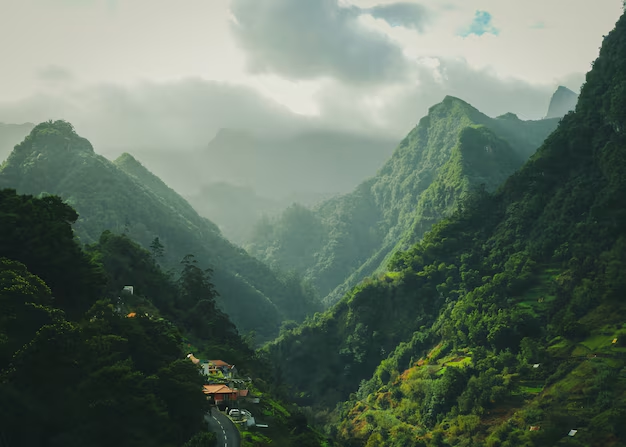Nature is an awe-inspiring force, offering a diverse array of landscapes and ecosystems that captivate the human spirit. From towering mountains that scrape the sky to the vast, mysterious depths of the oceans, the natural world is full of wonders waiting to be explored. Whether you’re an avid adventurer, a nature enthusiast, or someone seeking peace in the beauty of the outdoors, these two realms—mountains and oceans—serve as the most profound and spectacular elements of our planet. This article delves into the wonders of nature, from the majestic heights of mountains to the vast expanse of oceans, showcasing their beauty, significance, and the role they play in shaping life on Earth.
1. The Majestic Mountains
Mountains are more than just geographical features—they represent the power and resilience of nature. From the snow-capped peaks of the Himalayas to the rugged cliffs of the Rocky Mountains, mountains have long fascinated humans. These towering giants form the backbone of many regions around the world, and their grandeur leaves a lasting impression on all who witness them.
Mountains not only offer stunning vistas but are home to unique ecosystems. The higher altitudes of mountains create diverse climates and habitats, ranging from dense forests at the base to icy, barren landscapes near the summit. This variation supports an incredible range of flora and fauna, some of which are found nowhere else on Earth. For instance, the rare snow leopard of the Himalayas and the hardy Alpine flowers that bloom in the high-altitude meadows are just a few examples of the diversity mountains foster.
For adventurers, mountains also offer some of the most sought-after destinations for outdoor activities such as hiking, mountaineering, skiing, and climbing. The challenge of conquering a mountain summit is a testament to the human spirit’s resilience and determination.
2. The Enchanting Oceans
The oceans, covering about 71% of the Earth’s surface, are the lifeblood of our planet. Their depths remain largely unexplored, holding countless mysteries and ecosystems that continue to captivate the scientific community. Oceans are crucial to life on Earth, regulating our climate, providing oxygen, and being home to an immense variety of life forms, many of which have yet to be discovered.
Beneath the waves, the oceans are teeming with life. From the majestic blue whales, the largest animals to have ever lived, to the vibrant coral reefs that house thousands of species of fish, the ocean’s biodiversity is staggering. Coral reefs, often called the “rainforests of the sea,” are not only breathtakingly beautiful but also essential for supporting marine life and maintaining the ecological balance of the ocean.
For those seeking adventure, the oceans provide a playground for activities like scuba diving, snorkeling, surfing, and sailing. Exploring the underwater world reveals hidden treasures like shipwrecks, exotic marine creatures, and coral gardens that make for an unforgettable experience. The ocean’s allure lies in its sense of mystery, vastness, and ever-changing nature, offering an adventure for both the curious and the daring.
3. The Interplay Between Mountains and Oceans
While mountains and oceans may seem vastly different, they are intricately connected in the grand scheme of nature. Mountains play a significant role in shaping weather patterns and influencing ocean currents. For example, mountain ranges affect the flow of air and moisture, impacting rainfall patterns and ocean salinity. This, in turn, has a profound effect on marine life and ecosystems.
Furthermore, the weathered mountains give rise to rivers and streams that flow into the ocean, bringing with them nutrients that support marine life. The interplay between these two natural wonders creates a delicate balance, sustaining both terrestrial and marine ecosystems.
The geological processes that form mountains and shape the ocean floor are also interconnected. Volcanic activity, for example, can give rise to both towering mountains and deep oceanic trenches. Understanding these processes allows us to appreciate the constant movement and evolution of our planet’s landscape.
4. The Importance of Conservation
Both mountains and oceans are facing growing threats due to human activity. Deforestation, pollution, overfishing, and climate change are all contributing to the degradation of these natural wonders. Glaciers are melting at alarming rates, and mountain ecosystems are being disrupted by increased tourism and industrial activities. Similarly, the oceans are plagued by plastic pollution, coral bleaching, and the depletion of marine species due to overfishing.
It is crucial to protect these environments for future generations. Conservation efforts such as creating national parks and marine protected areas, reducing carbon emissions, and supporting sustainable practices can help preserve the beauty and health of our planet’s mountains and oceans. Through education, responsible tourism, and active engagement in conservation, we can ensure that these natural wonders continue to thrive.
Frequently Asked Questions (FAQs)
- Why are mountains important to the environment? Mountains play a key role in regulating the Earth’s climate, providing fresh water through glaciers and snowmelt, and supporting diverse ecosystems. They also help control weather patterns and influence ocean currents.
- What are coral reefs and why are they important? Coral reefs are underwater structures made from calcium carbonate secreted by coral organisms. They support an incredibly diverse range of marine life and are vital for maintaining the health of ocean ecosystems.
- What activities can I do in the mountains? Mountains offer a range of outdoor activities such as hiking, skiing, mountaineering, rock climbing, and mountain biking. They also provide opportunities for wildlife watching and photography.
- How do oceans affect the climate? Oceans play a crucial role in regulating global temperatures by absorbing heat from the sun and redistributing it across the planet. They also influence weather patterns and the water cycle.
- How does pollution affect the oceans? Pollution, including plastic waste, chemicals, and oil spills, harms marine life and ecosystems. It can lead to the death of marine species, the destruction of coral reefs, and the contamination of food sources for humans.
- What is the significance of mountain biodiversity? Mountain ecosystems support unique plant and animal species adapted to specific climates and altitudes. This biodiversity is crucial for maintaining ecological balance and offering valuable resources for medicine, food, and research.
- Can we explore the entire ocean? No, only a small percentage of the ocean has been explored. Due to its vastness and depth, much of the ocean remains a mystery, and many species and underwater features are yet to be discovered.
Conclusion
The wonders of nature, from the towering peaks of mountains to the endless expanse of the oceans, are among the most beautiful and awe-inspiring aspects of our planet. These natural landscapes not only provide breathtaking views and opportunities for adventure but also play vital roles in sustaining life on Earth. Protecting and preserving these environments is crucial for the health of our planet and the future of all its inhabitants. Whether you seek the challenge of scaling a mountain or the serenity of exploring the ocean’s depths, nature offers a wealth of experiences that remind us of the beauty and fragility of the world around us.
Key Takeaways
- Mountains are crucial for biodiversity, water sources, and climate regulation, offering adventure and inspiration for all who visit.
- Oceans support a vast array of life and play a significant role in regulating the Earth’s climate and weather patterns.
- The connection between mountains and oceans shapes the planet’s ecosystems, highlighting the importance of understanding natural processes.
- Conservation efforts are vital for preserving these natural wonders in the face of growing environmental challenges.
- Adventure seekers can find unique opportunities for exploration and personal growth in both mountain landscapes and the ocean depths.




